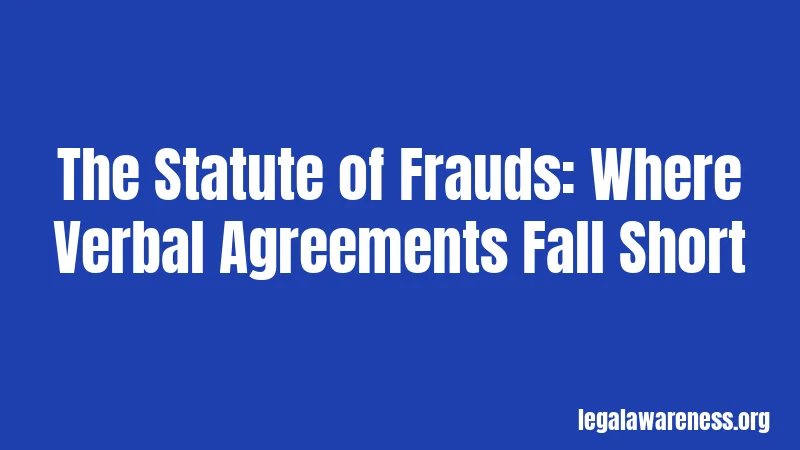Verbal Agreement Laws in Texas (2026): Complete Legal Guide
Most people have no idea how seriously Texas takes verbal agreements. Seriously. You might think a handshake deal doesn’t count for much in the legal world. But in Texas, spoken promises can hold real power, and they can also get you into real trouble.
The tricky part? Texas has some very specific rules about which verbal agreements are actually legally binding and which ones are basically worthless in court. Let’s break down exactly what you need to know.
What Is a Verbal Agreement?

A verbal agreement is a promise made between two people using words instead of a written contract. Think of it like a conversation where both people agree to do something. No papers. No signatures. Just words and trust.
Here’s the thing about Texas: the state actually recognizes verbal agreements as real contracts in many situations. This might surprise you. But here’s the catch that really matters. Some types of agreements must be in writing to be legally binding, even if you have witnesses and a video recording of the conversation.
Basic Texas Contract Law
Okay, pause. This part is important.
For a verbal agreement to be a real contract in Texas, it needs four key pieces. Both people have to agree on what they’re doing. There has to be something of value exchanged (like money, services, or goods). Both people have to intend for it to be a legal agreement. And they both have to understand the main terms clearly enough.
Wondering if your verbal agreement counts? Not sure what counts as consideration? Here’s what you need to know. Consideration basically means something valuable changes hands. It could be money. It could be a promise to do work. It could be your old car. Basically, both sides have to get something out of the deal.
This is where it gets straightforward. If one person just makes a promise and gets nothing in return, that’s not a contract. That’s just a gift. And gifts aren’t enforceable in court.
The Statute of Frauds: Where Verbal Agreements Fall Short

Hold on, this is the big one.
Texas has a rule called the “Statute of Frauds.” This rule says certain types of agreements can’t be legally binding unless they’re in writing. Even if you have a perfect verbal agreement, even if both people remember every detail exactly the same way, these agreements still won’t hold up in court.
Let me break down what has to be in writing. Any agreement to buy or sell land needs to be written down. This is probably the biggest one. If you agree to buy a house or a piece of property, get it in writing. Verbal land deals are basically worthless in Texas courts.
Here’s what else needs writing. Agreements that can’t be completed within one year from when you make them have to be in writing. Think of it like this: if you promise to do something, and it’s physically impossible to finish within a year, write it down. Agreements to pay someone else’s debt need to be written. Marriage agreements need to be in writing. Estate deals have to be in writing.
This matters a lot. Let’s say your uncle promises to lend you ten thousand dollars to help with your business. You shake hands on it. But then he changes his mind. You can’t go to court and win, not without something in writing. That’s rough, but that’s how Texas law works.
Business and Service Agreements
Now let’s talk about things you can actually enforce verbally.
Most business agreements can be verbal and still be binding, as long as they can be completed within one year. Honestly, this is probably the most important rule for everyday people.
Say you hire a contractor to fix your roof. You call them up and agree on a price. They say they’ll do it next week. You don’t need a written contract for this to be legally binding. It can happen within a year, easily, so a verbal agreement works in Texas.
But here’s where it gets tricky. If there’s any dispute later about what was actually promised, you’re going to have a rough time proving it. You’ll need witnesses. You’ll need evidence. You’ll need things like text messages or emails that show what you agreed to.
Personal service agreements work the same way. You hire someone to tutor your kid. You agree on an hourly rate. That’s a binding verbal contract. If the tutor doesn’t show up and refuses to pay you back, you could potentially take them to small claims court and win.
Exceptions and Special Cases

Not sure if your situation is covered? Here’s where things get interesting.
Some verbal agreements can’t be enforced even if they could be completed in a year. Employment contracts longer than a year need to be in writing. Sales of goods over five hundred dollars technically need to be in writing if there’s no written confirmation between you. Wait, not always. If you’ve already received the goods or already paid, a verbal agreement can be enforceable.
This one’s probably the most important rule. Texas recognizes something called “part performance.” This means if you’ve already done your part of the deal, a court might enforce a verbal contract even if it technically needed to be written. For example, you agree verbally to buy someone’s car for three thousand dollars. You pay the three thousand and drive the car away. Now it’s probably enforceable, even though technically it should have been in writing.
Real talk? This is where courts have some flexibility. They might enforce your verbal agreement even if it doesn’t perfectly fit the rules. But relying on this is risky. Don’t bank on it.
Recent changes to Texas law have actually made some of this clearer. The state has been tightening up rules around what counts as evidence of a verbal agreement. Text messages and emails are pretty solid evidence now. Video recordings can help too. But if it’s just your word against theirs, that’s way harder to win.
What Happens If Someone Breaks a Verbal Agreement?
So what happens if someone breaks their promise? Let’s talk about the penalties and your options.
If you have a binding verbal agreement and someone breaks it, you can sue them in civil court. This isn’t criminal law. You won’t get them arrested. But you can win money damages if you prove your case.
Here’s how it works in Texas small claims court. You can sue for up to ten thousand dollars. You don’t need a lawyer. The process is pretty straightforward. You pay a filing fee (usually between fifty and three hundred dollars depending on how much you’re suing for). You present your evidence. The judge decides if the other person broke the agreement.
The tough part is proving everything. You need to show the agreement actually existed. You need to show what the terms were. You need to show the other person broke it. And you need to show what it cost you. Without written proof, this gets hard. That’s why judges really want to see texts, emails, or witness testimony.
If you win in small claims court, you get your money. If the other person doesn’t pay, you can try to collect through wage garnishment or bank account freezes. But honestly, getting the money out of someone who doesn’t want to pay is the hard part. The judgment is just the first step.
Think of it like this. A written contract is like having an insurance policy. A verbal agreement is like hoping everything works out. Sometimes it does. Sometimes you’re stuck without proof.
Practical Steps to Protect Yourself
Here’s where it gets helpful.
First, always get important agreements in writing. I know, I know, it sounds formal. But a simple text that says “I agree to pay you three hundred dollars to fix my fence on Saturday” is better than nothing. It doesn’t have to be fancy. It just has to be clear.
Keep records of everything. Texts. Emails. Photos of the work done. Receipts. Video messages. Anything that shows what you agreed to and what happened. This is your evidence if things go sideways.
Use witnesses. If you’re making a big verbal agreement, do it in front of someone else. Have that person remember what was said. Better yet, get them to send you an email after confirming what they heard.
Take notes right after the conversation. Write down the date, the time, who was there, and exactly what was agreed to. Your own notes aren’t always admissible in court, but they help you remember the details when you testify.
If the agreement involves anything in the “Statute of Frauds” category, just bite the bullet and get it in writing. Land deals, year-long promises, marriage stuff, debt agreements. These absolutely need written documentation.
Consider having someone else be a witness or write things down. This person becomes your evidence later. They can testify about what they heard.
Trust me on this one. The worst time to realize you don’t have proof is when you’re in court trying to explain a handshake deal to a judge.
Frequently Asked Questions
Are verbal agreements legally binding in Texas?
Yes, most verbal agreements are legally binding in Texas, as long as they’re not one of the types that requires writing (like land sales or year-long contracts). You can enforce them in court, but you need proof.
What if I have witnesses to the verbal agreement?
Witnesses help a lot. They can testify in court about what they heard. Their testimony is solid evidence. But your witness needs to be credible and remember accurately.
Can text messages count as proof of a verbal agreement?
Absolutely. Text messages are written proof that an agreement existed and show what was discussed. They’re actually better than just the verbal agreement alone because they’re documented.
What should I do if someone breaks their verbal agreement?
Document everything that happened. Keep records of any losses. Try to resolve it by talking to them first. If that doesn’t work, consider small claims court or hire a lawyer to send a demand letter.
How much can I sue for in small claims court in Texas?
You can sue for up to ten thousand dollars in Texas small claims court. If you’re owed more, you’d need to file in regular civil court, which typically requires a lawyer.
Should I always get verbal agreements in writing?
Yes. For anything important, get it in writing. Even a simple email confirming the agreement is better than nothing. It takes two minutes and protects both people.
Final Thoughts
Verbal agreements are real in Texas, and they can hold up in court. But they’re risky because they depend on memory, witnesses, and proof. The smart move is simple: when money or anything important is involved, write it down. It doesn’t have to be complicated. A text, an email, or even a quick note with both people’s signatures works fine.
You’re not alone if this confuses you. Most people don’t realize how strict Texas is about written documentation for certain agreements. The key takeaway? Get things in writing when you can. Keep records when you can’t. And if there’s a dispute, gather every piece of evidence you can find.
Now you know the basics. Stay informed, protect yourself with documentation, and when in doubt, talk to a lawyer. They can look at your specific situation and tell you exactly where you stand.
References
Texas Courts Online: Small Claims Court Information
